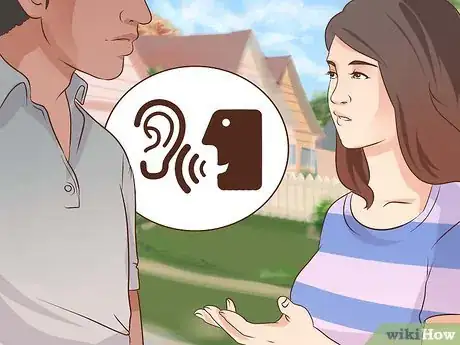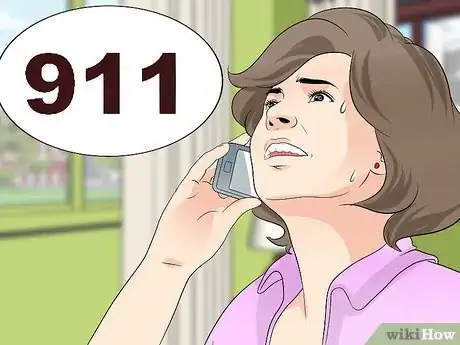This article was co-authored by Trudi Griffin, LPC, MS. Trudi Griffin is a Licensed Professional Counselor in Wisconsin specializing in Addictions and Mental Health. She provides therapy to people who struggle with addictions, mental health, and trauma in community health settings and private practice. She received her MS in Clinical Mental Health Counseling from Marquette University in 2011.
There are 7 references cited in this article, which can be found at the bottom of the page.
This article has been viewed 84,158 times.
When a family member is contemplating suicide, it doesn't just affect the individual. It will take an emotional toll on all the other family members as well. If your sibling is thinking of taking their life, you may feel a variety of emotions — sad that they are hurting, angry that they would leave you, or frightened that they just might follow through. Learn how you can support your sibling and help them get needed treatment.
Steps
Being a Source of Support
-
1Ask how you can help. It may seem obvious to pose such a question, but doing so shows your genuine concern and commitment to helping your sibling get better. Professional help is required to help your sibling overcome whatever they're feeling. However, there may be something you can do immediately to make them more comfortable or temporarily distract them from upsetting thoughts or feelings.
- Approach your sibling and say, "You haven't seemed like yourself lately. What can I do to support you better?"
-
2Listen to show you care. Simply listening to your sibling vent their frustrations or fears may offer them some level of comfort. Rushing to reassure or dismiss without hearing the person's full story is a common mistake made by friends and loved ones of suicidal persons.[1] Pull up a chair and find a quiet place for the two of you to go so that they can express what they're feeling. Actively listen by:
- Asking open-ended questions: "What happened to make you feel this way?" or "How long have you been feeling this way?"
- Summarizing what the person said: "So, you've been feeling pretty bad ever since you dropped out of college."
- Reflecting, or repeating a word back: Your sibling says, "Yes, I've felt just lost in my life since then." You can reflect by repeating, "Lost..." to encourage them to continue.
- Clarifying points that the person skirts over: "Tell me more about that."
- Reacting to the message: "You have really been having a tough time. I appreciate you sharing your feelings with me."
Advertisement -
3Refrain from judging, criticizing or blaming. Becoming angry because they want to take their life, blaming yourself or your parents for how they feel, or chastising them for breaking moral or religious principles will only lead to your sibling retreating further into themselves and pushing you out. Leave your own ego and agenda at the door. Being a source of support means putting aside any differences of opinion to show genuine concern for this person.
- If you have the urge to state a judgment, such as "Oh, that's what bothering you?", just don't say anything at all. Practice your active listening skills and be present for your sibling.
- You might say something like, "We all think or feel things we aren't proud of. I won't judge you for what you think or how you feel."
-
4Be hopeful.[2] Feeling depressed and suicidal can be the equivalent of having a stormy gray cloud overhead that doesn't seem to ever leave. Give your sibling a small ray of sunshine by demonstrating your belief in them and hope for the future. You might say something like:
- "I know it seems hard, but you can feel better with professional help."
- "It may not look like it today, but these feelings are only temporary."
- "You are not alone."
- "Your life is important to me. Whatever it takes, I will help you through this."
-
5Offer physical touch. If you and your sibling generally have a touchy-feely sort of relationship, a hug just might show them how much you care. Hugs release oxytocin, a hormone that is known to reduce stress and increase the sense of trust and security. If a hug isn't your guys' thing, a pat on the back or throwing an arm around their shoulder might do the trick.
- If physical touch isn't normally exchanged between the two of you, show your concern in verbal ways like listening or asking how you can help.[3]
Getting Help
-
1Avoid agreeing to keep it a secret. If your sibling shares suicidal thoughts with you, they may plead with you to keep it between the two of you. It can be understandable for siblings to share sensitive information, but suicidal thoughts should never be kept confidential. You may need to tell a range of people, so avoid swearing confidentiality and you can avoid breaking a promise later.[4]
- For example, you might say to your sibling, "I'm sorry, but I cannot keep this a secret. I want you to live, and that means telling someone so you can get the help you need."
-
2Reach out to an adult. Your sibling may order, threaten or even beg you not to do so, but a very important step here is telling someone immediately. Alerting a parent is best, as this is someone who lives with and loves both you and your sibling. Also consider telling another close relative, such as a grandparent, aunt, uncle, or older sibling, or a school counselor if your parents are unreachable.
- Teens may fear being judged or getting their parents angry. If your sibling says they don't want to tell them, offer to do it with them. The two of you might go to your parents and you hold their hand as they say something like, "My life has been really crappy lately and I have thought of how to kill myself."[5]
- Or, if they refuse to talk to them, you might approach them and share your concern. "Mom, Dad, I'm really worried about Ben. He told me he has been wanting to kill himself, and I believe him. We need to get him some help." Respectfully let them know that you are serious and if they don't act on your urges to get them help, you will tell others (other close family members, a school counselor, etc.) until someone listens.
-
3Develop a safety plan. Once you involve an adult, all of you can get together and create a safety plan to help your sibling feel safe and secure in an acute situation. Such a plan details what actions your sibling can take and people they can call to feel safe from suicide.
- A safety plan template is available from the National Suicide Prevention Lifeline. This document allows your sibling to list any contact numbers they can call, such as their therapist, the suicide hotline, or the local emergency room.
- It will also include warning signs that your sibling may notice when feeling suicidal and coping strategies they can use to take their mind off these thoughts and feelings, like phoning a friend, taking a walk, or exercising.[6]
-
4Convince your sibling to see a mental health professional. Contact a psychiatric treatment hospital, a local therapist, or call/text the Suicide and Crisis Lifeline at 988. A professional can assess your sibling's situation and determine whether they need to be hospitalized for intensive treatment.[7]
- If your sibling is resistant to treatment, ask them to do it for you as a favor or gift. For example, you might say, "Having you feel better and more hopeful is important to me. That's why I'm asking you to see a psychologist that will help you with what you're going through. I know you don't want to, but it would give me peace of mind."
- Take things further by facilitating the process. Research a therapist who specializes in suicide or depression and set up an appointment for your sibling. Reassure them that you will attend the appointment with them.
-
5Continue to show support throughout treatment. You may think that after your sibling has been seen by a professional that your job is done. It's not. Keep up your show of support and encourage them to commit to treatment.
Recognizing a Crisis Situation
-
1Know the signs of suicidal behavior. Are you on the fence about telling someone about your sibling's suicidal comments because you are not quite sure if they are legitimate? Remember, all suicidal threats are serious. Look for these and other signs that indicate suicidal behavior:[8]
- Showing no hope for the future
- Talking about death frequently
- Giving away possessions
- Feeling like a burden to others
- Withdrawing from friends or family
- Neglecting personal responsibilities (e.g. work, school, or extracurriculars)
- Making visits to loved ones or acting as if he is saying goodbye
- Seeking out means to cause harm (e.g. weapons or pills)
- Acting recklessly; using drugs or alcohol; practicing unsafe sex
-
2Stay with them if you believe they're in immediate danger.[9] If your sibling is showing signs of being in an acute crisis, meaning they seem likely to harm themselves, tell them you will stay with them. Then, follow through. If you need to go away, assign another family member to be with them. Never leave them alone.
- Take note: if your sibling requires constant watch to prevent suicide, they should probably be under medical and psychiatric care in a hospital.
-
3Remove any means of suicide from the area. To prevent your sibling from taking their life, you and your family should remove all items which can be used fatally from the home. These may include knives, razors, firearms, and pills.[10]
-
4Call for emergency help. If your sibling is in an acute crisis and seriously contemplating suicide, you and your family need to get them to the nearest hospital as soon as possible. If, for some reason, you cannot get them to the emergency room, call 911 or your local emergency number.[11]
-
5Contact any existing therapists to update them. If an acute suicidal situation is occurring after your sibling has established a relationship with a counselor or therapist, call this professional to make them aware of the circumstances. Likely, this person will want to come to the hospital to talk to the doctors there.[12]
Warnings
- If things get serious, or a suicide attempt is witnessed, notify your parents and/or call the emergency services immediately.⧼thumbs_response⧽
References
- ↑ http://www.med.wisc.edu/news-events/listening-plays-role-in-suicide-prevention/837
- ↑ http://www.helpguide.org/articles/suicide-prevention/suicide-prevention-helping-someone-who-is-suicidal.htm
- ↑ https://www.mentalhelp.net/articles/about-helping-a-friend-or-family-member-who-is-suicidal/
- ↑ http://www.helpguide.org/articles/suicide-prevention/suicide-prevention-helping-someone-who-is-suicidal.htm
- ↑ http://www.speakingofsuicide.com/2013/05/29/parents-and-teens/
- ↑ https://suicidepreventionlifeline.org/wp-content/uploads/2016/08/Brown_StanleySafetyPlanTemplate.pdf
- ↑ https://www.psychologytoday.com/blog/all-in-the-family/201401/what-do-when-someone-is-suicidal
- ↑ http://www.mind.org.uk/information-support/types-of-mental-health-problems/suicide-supporting-someone-else/#.VrkBnhgrLcc
- ↑ https://www.psychologytoday.com/blog/all-in-the-family/201401/what-do-when-someone-is-suicidal








































































